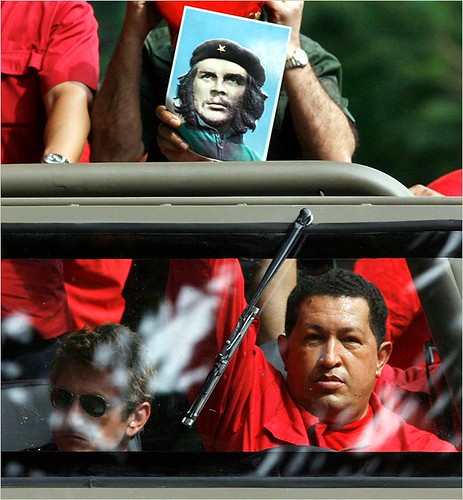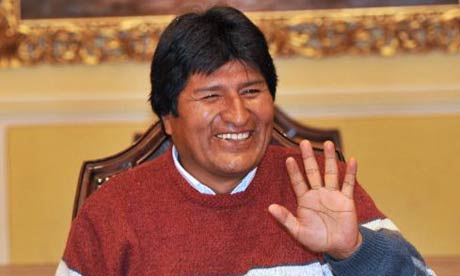latin america
Venezuela: ‘Our votes are for Chavez and the revolution’

By Federico Fuentes
Caracas, October 31, 2008 -- “On November 23, we will not just be voting for this or that governorship, we will be deciding the destiny of this revolutionary process”, Stalin Perez Borges, a national coordinator of the National Union of Workers (UNT) and United Socialist Party of Venezuela (PSUV) militant, told Green Left Weekly.
On that day, regional elections for 23 governorships, more than 300 mayors and hundreds of state legislative assembly members will occur — a crucial contest between the revolutionary forces lead by President Hugo Chavez (mainly grouped in the PSUV) and the US-backed right-wing opposition.
Perez Borges and militants from the different union currents that are also in the PSUV have been organising in their unions and workplaces to ensure a strong victory in these elections.
“Our position is that, despite some of the problems that exist, we as revolutionaries will be participating not just on voting day, but in the campaign. This is the best way to strengthen and deepen the process.”
Overwhelming UN General Assembly vote against US blockade of Cuba
Of the 192 UN member states, 185 voted in favour of the resolution, while three voted against (the United States, Israel and Palau) and two abstained (Marshall Islands and Micronesia). With this result, Cuba gained another vote this year compared to 2007, when 184 voted in favour, four against (the United States, Israel, Palau and the Marshall Islands) and Micronesia abstained.
The resolution calling for an end to the blockade has been approved on 16 occasions with backing that has grown from 59 votes in 1992 to the 185 today.
Before the vote, Cuban Foreign Minister Felipe Pérez Roque spoke before the General Assembly and noted the special situation in which this resolution is taking place, an economic crisis that is being internationally felt and above all, the imminent US elections which, he observed, will produce a new president who "will have to decide whether the blockade is a failed policy."
"You are alone, isolated," said the foreign minister, addressing President George W. Bush. Pérez’ speech was loudly applauded by the General Assembly.
Sister of Cuban hero jailed in US demands `Free the Cuban Five!'
Maria Eugenia is the sister of Tony Guerrero, one of the “Cuban Five'' political prisoners held for 10 years in US prisons on “conspiracy to commit espionage'' charges for reporting on the Miami-based, W
Bolivia: Unprecedented alliance defeats right-wing assault (now with audio)

NOW with audio: Listen to
Venezuela: Between assassination plots and abstention

By Federico Fuentes, Caracas
October 25, 2008 -- Talk of assassination plots and rising concerns about a high abstention rate have marked the beginning of the November 23 regional elections race here in Venezuela.
Formally at stake are 23 governorships, more than 300 mayorships and hundreds of representatives on the state legislative councils. However, the result of these elections could also have an important impact on the future of the Bolivarian Revolution led by the Chavez government.
During the November 2004 regional elections, the pro-Chavez forces, on the back of the thumping victory in the August 2004 recall referendum on Chavez’s mandate, painted the electoral map red as they swept into 21 of the 23 governorships up for election (they later rewon the governership of Amazonas to make it 22 out of 24 all up).
Hugo Blanco: `No contradiction between my indigenous struggle and dialectical materialism'

Interview with veteran Peruvian Marxist Hugo Blanco, conducted by Yásser Gómez for
Tenue au Venezuela, à Caracas, du 8 au 11 octobre 2008 en présence d’experts et de chercheurs en provenance d'Argentine, d'Australie, de Belgique, du Canada, du Chili, de Chine, de Corée du Sud, de Cuba, d’Egypte, d'Équateur, d'Espagne, des États-Unis, des Philippines, de France, d'Angleterre, du Mexique, du Pérou, d'Uruguay et du Vénézuéla, la Conférence Internationale d'Économie Politique « Réponses du Sud à la Crise Économique Mondiale » a ouvert un large débat sur l'actualité économique et financière de l'économie mondiale, les nouvelles perspectives et les défis que doivent relever les gouvernements et les peuples du Sud.
Debemos aprender las lecciones del siglo XX para aplicarlas al comienzo del siglo XXI
Eric Toussaint
[Click HERE for the English translation]
By Eric Toussaint, translated by Federico Fuentes for Links International Journal of Socialist Renewal
October 11, 2008 -- Academics and researchers from Argentina, Australia, Belgium, Canada, Chile, China, Cuba, Ecuador, France, Mexico, Peru, Phillipines, South Korea, Spain, United Kingdom, United States, Uruguay and Venezuela participated in the International Political Economy Conference: Responses from the South to the Global Economic Crisis, held in Caracas October 8-11, 2008. The conference stimulated a wide-ranging debate on the current economic and financial health of the global economy, the new perspectives and the challenges to the governments and peoples of the South posed by the international financial crisis.
The meeting concluded that the situation has worsened in the last few weeks. It has progressed rapidly from being a series of crises in the financial markets of countries in the centre and has turned into an extremely serious international crisis. This means that countries in the South are in a very difficult situation.
The crisis threatens the real economy and, if energetic and effective actions are not taken immediately, all peoples in the world could be drastically punished; especially the least-protected and most-neglected sectors.
Evo Morales: Ten commandments to save the planet

By Evo Morales Ayma, president of the Republic of Bolivia
Message to the Continental Gathering of Solidarity with Bolivia in Guatemala CityOctober 9, 2008 -- Sisters and brothers, on behalf of the Bolivian people, I greet the social movements of this continent present in this act of continental solidarity with Bolivia.
We have just suffered the violence of the oligarchy, whose most brutal expression was the massacre in Panda, a deed that teaches us that an attempt at power based on money and weapons in order to oppress the people is not sustainable. It is easily knocked down, if it is not based on a program and the consciousness of the people.
We see that the re-founding of Bolivia affects the underhanded interests of a few families of large landholders, who reject as an aggression the measures enacted to favour the people such as a more balanced distribution of the resources of natural gas for our grandfathers and grandmothers, as well as the distribution of lands, the campaigns for health and literacy, and others.
Refounding Bolivia: Morales calls for vote on a new democratic constitution

at the sacred place of Tiwanaku.
Photo: AFP
By Raul Burbano
October 13, 2008 -- Bolivian President Evo Morales has called for a national referendum on the country’s new draft constitution on December 7. The demand of the Bolivian people for a new and socially, politically and economically inclusive constitution is at the heart of the present political upheaval in that country.
Right-wing forces representing the country’s traditional ruling oligarchy have launched a secessionist movement to balkanise the country, in an attempt to block the constitutional referendum. They have organised murderous fascist gangs to terrorise the population.
They are backed by the US government, whose ambassador, Philip Goldberg, has recently been expelled from Bolivia for his support of the opposition and openly admitted interference in Bolivian political life.
On the other side the vast majority of the Bolivians, more than 67% of whom just voted support President Evo Morales in a recall referendum.